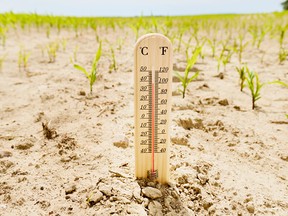Breadcrumb Trail Links
Geoengineering may be our only hope to limit dangerous feedbacks
 (Getty Images)
(Getty Images)
Article content
This is the second anniversary of the emergency but practically nobody is mentioning it. Instead, people are choosing to worry about more familiar problems like global trade wars, the rise of fascism and genocidal wars.
Two years ago this month (June 2023) the average global temperature jumped by a third of a Celsius degree in a single month. That shook the climate science world to its foundation, because the orthodox predictions assumed about one-tenth of a degree of warming every five years.
Advertisement 2
Article content
The June 2023 event was non-linear. It took more than another year – until last December – to figure out what actually happened.
Ninety per cent of the extra heat in the atmosphere from burning fossil fuels goes straight into the ocean. That heat was bound to affect the ocean currents, and sooner or later one of those currents would start returning very warm water to the surface.
The water gave up its heat to the air and suddenly, two years ago, the low-level clouds over the eastern North Atlantic started to thin out, letting in much more sunshine to warm the ocean’s surface. This chain of events, where the warming we cause triggers further changes in the climate, is called feedback and since we didn’t cause it directly, we can’t turn it off.
So, two years ago, we got three-tenths of a degree of warming in one huge lurch, from plus 1.2 degrees to plus 1.5 degrees in June 2023, and since then about one-tenth of a degree more in slow but steady warming. The average global temperature has been around plus 1.6 degrees for the past year.
Advertisement 3
Article content
Many scientists had hoped we could hold the warming to plus1.5 degrees at least until the mid-2030s, but that’s already past. This means more and bigger forest fires, floods, droughts, cyclones and killer heatwaves, which is bad enough – but it also turns the future into a minefield.
The never-exceed limit on warming, set by the Intergovernmental Panel on Climate Change (IPCC) 10 years ago, was plus two degrees. They chose that limit because they knew we would activate many feedbacks if the warming went past there. Some they knew about (such as melting permafrost), but they also feared there might be unexpected feedbacks.
It’s turning out that big unexpected feedbacks start kicking in at a much lower temperature. We hit one at plus-1.2 degrees two years ago, and for all we know there could be another feedback just ahead. In fact, feedbacks might even come in clusters that cascade and carry us quickly up into much higher temperatures. Unlikely, but not unimaginable.
Advertisement 4
Article content
So, suddenly the absolute priority is to hold the heat down. Greenhouse gas emissions must be stopped far sooner than the net-zero by 2050 target the IPCC originally set, but there is no way that can be done in less than 10 or 15 years and the World Meteorological Organisation says we could reach plus 1.9 degrees average global temperature as soon as 2029.
The only way to hold the heat down in the short term is geoengineering: direct intervention to reflect more sunlight back into space and thereby cool the planet. Many people are nervous about it, but we find ourselves in a position where geoengineering is the least bad option.
I spent three days in Cape Town last month interviewing many of the leading scientists in the field at the largest ever conference on geoengineering. None of the people to whom I spoke were ready to deploy geoengineering techniques now, but they could probably begin to deploy within five years if a crash programme were launched right away.
It’s a long shot, but that would be the best available outcome.
Gwynne Dyer is an independent journalist based in London, England, and author of a new book about climate change, Intervention Earth: Life-Saving Ideas from the World’s Climate Engineers.
Read More
Dyer: King may help Canada escape worse treatment from Trump
Dyer: Israel’s deadly strategy to clear Gaza will make it pariah
Article content
Share this article in your social network

